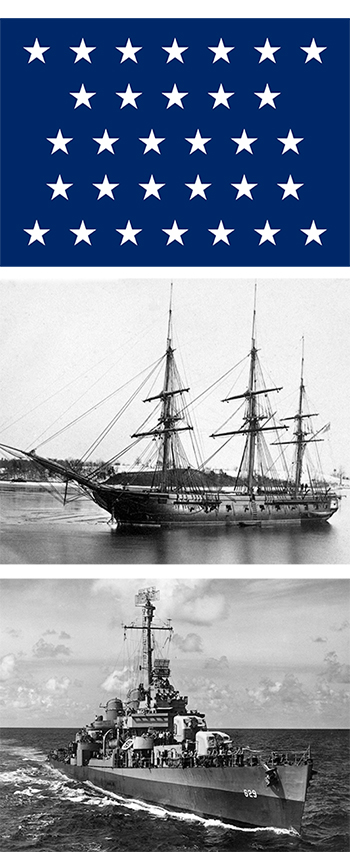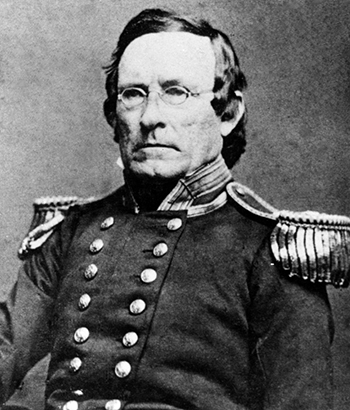
|
Joel Abbot |
 |
|||
| Rank, Service | ||||
Commodore, U.S. Navy |
||||
| Veteran of: | ||||
|
||||
| Tribute: | ||||
Joel Abbot was born on January 18, 1793, in Westford, Massachusetts. He received an appointment of Midshipman in the U.S. Navy on June 15, 1812, just three days before the beginning of the War of 1812 against England. He served aboard the heavy frigate USS President under the command of Commodore John Rodgers, and was aboard when that ship fired the first shots of the War of 1812. He became Rodger's aide and signal officer, and while in charge of a prize, Abbot was captured and taken as a Prisoner of War by the British. After his release, he was appointed to service on Lake Champlain under command of Commodore Thomas McDonough. During the Battle of Lake Champlain in September 1814, Abbot was given a secret mission to dress as a British officer to destroy British supplies behind enemy lines, for which he could have been executed as a spy. For his success and bravery in the engagement at Cumberland Head on September 11, 1814, Abbot received a sword of honor from the U.S. Congress, and he was commissioned a Lieutenant in the U.S. Navy. LT Abbot served aboard the frigate USS Congress from 1815 to 1817, and he began service as attaché aboard the frigate USS Guerriere in July 1818 cruising the Mediterranean. He was aboard the USS Guerriere when the ship delivered the American minister to Russia in September 1818, and in December 1818 he was placed in charge of a 30-gun pirate ship, the Mariana, which his ship had captured, and took the prize to Boston. From 1820 to 1821 Abbot served at the Charleston Navy Yard in Boston, and then sailed aboard the schooner USS Alligator to stop African slave traders and pirates along the African coast. During this time he also participated in a search for a stretch of land for the American Colonization Society to return former slaves to Africa, which later became the nation of Liberia. While at the Charleston Navy Yard, LT Abbot filed a formal accusation against a Navy purchasing agent and the yard's commandant for misappropriation of government property in January 1822, but after they were exonerated by a court of inquiry in August 1822, LT Abbot was tried by a general court martial and he was suspended from the Navy for 2 years. After returning to duty, Abbot was stationed aboard the sloop-of-war USS Warren in 1827, and he was assigned to the Receiving Ship, Boston, from 1830 to 1832. He was stationed aboard the sloop-of-war USS Vanalia in 1833, and he was promoted to Commander in 1838. CDR Abbot was stationed aboard the brig USS Dolphin in 1838, and he served as Executive Officer of the Boston Navy Yard from 1839 to 1842. He took command of the sloop-of-war USS Decatur in 1843, and was part of Commodore Perry's African squadron. During this time he learned that Bishop John Payne was in imminent danger and he promptly sailed to ship aid and saved him from a force of 500 armed Africans, for which he was commended by Commodore Perry and the Secretary of the Navy. He was promoted to Captain on October 3, 1850, and Commodore Perry selected Abbot to accompany him on his famous Japan expedition in 1852. CAPT Abbot was put in command of the corvette USS Macedonian and the ship departed New York in April 1853, and was with Perry until the negotiation of a treaty that would open Japanese ports to the commerce of the United States was accomplished. CAPT Abbot was then appointed Commodore of the U.S. Naval Force off the coasts of China and Japan, known as the East India Squadron. Under Commodore Abbot, the East India Squadron consisted of his flagship USS Macedonian, the steam frigate USS Powhatan, and the sloop-of-war USS Vandalia. As Chinese pirates were preying upon American vessels, Abbot's forceful strategy in the area received approval of the U.S. Government. Commodore Abbot died of malaria at Hong Kong, China, on December 14, 1855, while on active duty. His body was returned to the United States, and he was buried at South Burial Ground in Warren, Rhode Island. Two destroyers were named USS Abbot in honor of Commodore Abbot: USS Abbot (DD-184) which served from 1919 to 1940; and USS Abbot (DD-629) which served from 1943 to 1965. |
||||
|
||||

